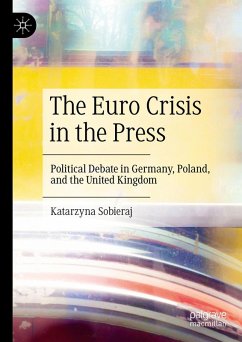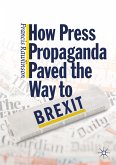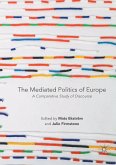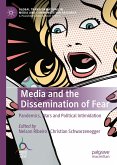"A much needed study which shows how the once highly contested 'Euro Crisis' has found wider resonance across the German, Polish and the UK public spheres thus shaping their discursive patterns of European integration in the new millennium. The book gives an excellent account of dynamics of Europe-related debates in pre-Brexit EU, and connects excellently to ongoing intellectual debates on how various crises have shaped today's EU-rope. An obligatory read for those interested in Europe, crisis, discourse as well as in wider politics of European integration."
-Prof. Michal Krzyzanowski, Chair in Media & Communications, Uppsala University, Sweden.
"The European media speak distinct, local languages, chiefly to national audiences. However, Katarzyna Sobieraj's book shows a powerful bonding factor, which is the neoliberal ideology rather than the quest for European solidarity. This book is highly recommended not only to students of media communication,but also to those interested in European politics, ideologies, and financial crises."
-Jan Zielonka is Professor of European Politics at the University of Oxford and Venice, Ca Foscari.
This book offers a comparative study of the political debate on the Euro crisis in the press. In the tradition of Critical Discourse Analysis, it investigates the ways in which discourse produces and reproduces social domination. The book examines the discursive constructions of the crisis in a selection of broadsheet newspapers in Germany, Poland, and the UK. It demonstrates how neoliberalism determined the hegemonic discourse on the Euro crisis, which resulted in ideologically biased discursive constructions that created and legitimised an image of non-agentic social change. The book will appeal to an international audience of discourse and media studies, political communication, and linguistics.
Katarzyna Sobieraj is based in Brussels and works at the European Commission. She completed her PhD at the University of Wroclaw and MA at Humboldt University in Berlin. She was an associate in 'The Euro Crisis, Media Coverage, and Perceptions of Europe within the EU' project at the Reuters Institute for the Study of Journalism, University of Oxford.
Dieser Download kann aus rechtlichen Gründen nur mit Rechnungsadresse in A, B, BG, CY, CZ, D, DK, EW, E, FIN, F, GR, HR, H, IRL, I, LT, L, LR, M, NL, PL, P, R, S, SLO, SK ausgeliefert werden.









